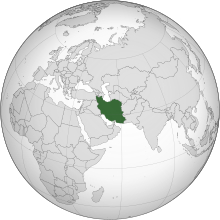
Back معاملة المثليين في إيران Arabic ইরানে সমকামীদের অধিকার Bengali/Bangla Drets del col·lectiu LGBT a l'Iran Catalan مافی ھاوڕەگەزخوازان لە ئێران CKB LGBT práva v Íránu Czech Homosexualität im Iran German Diversidad sexual en Irán Spanish حقوق الجیبیتی در ایران Persian Droits LGBT en Iran French זכויות להט"ב באיראן HE
LGBTQ rights in Iran | |
|---|---|
 | |
| Status | Same-sex relations illegal: Islamic law is applied. |
| Penalty | Execution, imprisonment, lashings, fines.[1] |
| Gender identity | Sex reassignment surgery, which is required to change legal gender, is legalized and is partially paid for by the government. |
| Military | No |
| Discrimination protections | None |
| Family rights | |
| Recognition of relationships | No recognition of same-sex unions |
| Adoption | No |
Lesbian, gay, bisexual, and transgender (LGBTQ) people in Iran face severe challenges not experienced by non-LGBTQ residents. Sexual activity between members of the same sex is illegal and can be punishable by death,[2][3][4] and people can legally change their assigned sex only through sex reassignment surgery. Currently, Iran is the only country confirmed to execute gay people, though death penalty for homosexuality might be enacted in Afghanistan.
LGBT rights in Iran have come in conflict with the penal code since the 1930s.[5] In post-revolutionary Iran, any type of sexual activity outside a heterosexual marriage is forbidden. Same-sex sexual activities are punishable by imprisonment,[4] corporal punishment, fines, or execution.[2][3][4] Gay men have faced stricter enforcement actions under the law than lesbians.
The Islamic Republic of Iran is considered to be one of the most discriminatory towards homosexuals in the world.[6][7][8] It is estimated that hundreds or thousands[9][10][11] of people were executed in the immediate aftermath of revolution of whom some 20 were homosexuals. Ruhollah Khomeini called for them to be exterminated in 1979.[12]
Transgender identity is recognized through sex reassignment surgery. Sex reassignment surgeries are partially financially supported by the state. Some homosexual individuals in Iran have been pressured to undergo sex reassignment surgery in order to avoid legal and social persecution for being gay.[2][13][14] Iran carries out more sex reassignment surgeries than any other country in the world, ranking second place after Thailand.[14][2][15]
- ^ Tuysuz, Gul (May 15, 2021). "A card exempted a gay man from serving in Iran's military. It may have cost him his life". CNN. Retrieved May 15, 2021.
- ^ a b c d El-Bernoussi, Zaynab; Dupret, Baudouin (2017). "Sex Reassignment". Oxford Islamic Studies Online: 2, 3 – via HAL Open Science.
- ^ a b "Iran: Islamic Penal Code". Retrieved January 7, 2021.
Article 234: 'The hadd punishment for the receptive/passive party, in any case (whether or not he meets the conditions for ihsan) shall be the death penalty.' Article 236: 'If the active party is a non-Muslim and the passive party is a Muslim, the hadd punishment for the active party shall be the death penalty'
- ^ a b c Cite error: The named reference
Indwas invoked but never defined (see the help page). - ^ "Interview with Iranian President Mahmoud Ahmadinejad". Larry King Live. CNN. September 23, 2008. Retrieved June 29, 2014.
- ^ Banning-Lover, Rachel (March 1, 2017). "Where are the most difficult places in the world to be gay or transgender?". The Guardian. Retrieved January 7, 2021.
- ^ Weinthal, Benjamin (September 24, 2020). "Iran is the most dangerous country for gay travelers - report". The Jerusalem Post. Retrieved January 7, 2021.
- ^ "'We Are a Buried Generation' Discrimination and Violence against Sexual Minorities in Iran". Human Rights Watch. December 15, 2010. Retrieved January 7, 2021.
- ^ "Denied Identity: Human Rights Abuses Against Iran's LGBT Community" (PDF). Iran Human Rights Documentation Center. November 2013. Archived from the original (PDF) on November 13, 2020. Retrieved January 7, 2021.
- ^ Encarnacion, Omar (February 13, 2017). "Trump and Gay Rights: The Future of the Global Movement". Foreign Affairs. Retrieved January 7, 2021.
- ^ Weinthal, Benjamin (June 9, 2020). "Iran executes 'high number' of gays, says German intelligence". The Jerusalem Post. Retrieved January 7, 2021.
- ^ Parsi, Arsham (2014). "Iranian Queers and Laws: Fighting for Freedom of Expression". Harvard International Review. 36 (2): 53. JSTOR 43649271. Retrieved January 7, 2021.
- ^ "Iran's gay plan". Canadian Broadcasting Corporation. August 26, 2008. Archived from the original on April 16, 2009. Retrieved March 23, 2018.
- ^ a b Saeidzadeh, Zara (2014). "The legality of sex change surgery and construction of transsexual identity in contemporary Iran". Lund University. pp. 12, 13, 7, 18, 48, 49. Sociology of Law, Master's thesis on Social Studies of Gender
{{cite web}}: CS1 maint: postscript (link) CS1 maint: url-status (link) - ^ Zagami, Samira E.; Roudsari, Robab L.; Sadeghi, Ramin (August 5, 2019). "Quality of Life After Sex Reassignment Surgery: A Systematic Review and Meta-Analysis" (PDF). Iran J Psychiatry Behav Sci: 1. doi:10.5812/ijpbs.69086.
{{cite journal}}: CS1 maint: date and year (link)